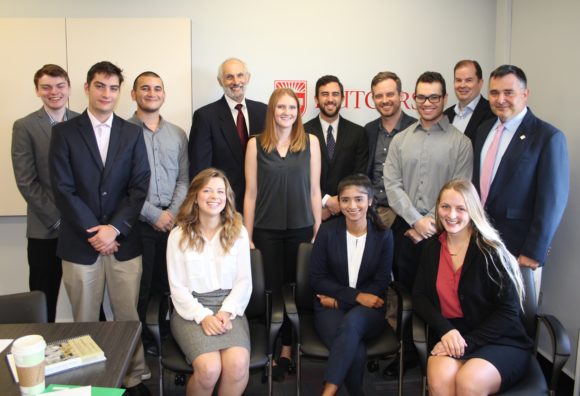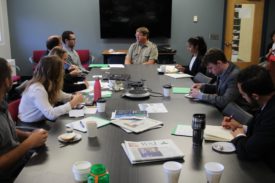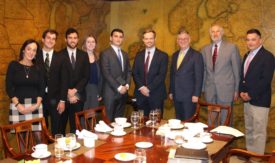
Ag Scholars fall semester 2019: Front row seated (l-r): Darrian Beam, Rhea Bolar, Caleigh Holland. Back row standing, (l-r): Nick Brennan, Greg Master, Max Blatt, Ira Polk, Emily Cohen, Ameen Lotfi, Will Habermann, Steven Mitchell, Brian Schilling, Stephen Komar. Photo: Lisa Chiariello
After retiring from a highly successful career in commodities finance, Ira Polk could not rest on his laurels. In fact, he was compelled to do the opposite, and that meant investing in the cultivation of a new generation of business leaders. As a director of the Clearing Corporation Charitable Foundation (CCCF), Polk and his like-minded colleagues have set their sights on funding student training and scholarship programs at various universities. With his interest in grooming a new generation of professionals in agribusiness and his connection to his alma mater in his home state of New Jersey, Polk bestowed something beyond the $1.5 million endowment and additional matching grants and infrastructure improvements from CCCF–he gave of himself–by extending his network, knowledge, wisdom and insight to the CCCF Agribusiness Scholars Program at Rutgers School of Environmental and Biological Sciences (SEBS).
As much as classroom, lab and field experience contribute to students’ knowledge base for professional careers, these venues do little to extend their academics into the real world of business to gain the seasoned expertise from individuals inside the industry. Steve Komar, professor and agriculture and natural resources agent for Rutgers Cooperative Extension of Sussex County and Brian Schilling, professor and director of Rutgers Cooperative Extension recognized this and were eager to develop the program.
“I’ll be honest,” said Polk, “when I first approached Steve about our vision for the program, I wasn’t sure that academia was ready for this type of program. I am extremely happy to report that the program is progressing better than anticipated, principally because of Brian and Steve’s efforts and the participants, who have wholeheartedly embraced the concept. The students are treated like future leaders, and they have accepted the challenge and are starting to think and act like leaders.” To gain foothold, Polk conveys the strategic plan for the program, “We are building a core of students, alumni, mentors and sponsors that are going to make this program well-regarded in the ag and business communities and bring recognition to Rutgers School of Environmental and Biological Sciences.
The Clearing Corporation Charitable Foundation Agribusiness Scholars program enters its second year in the fall semester of 2019, with three students from the inaugural class (two other inaugural students have since graduated) and the commencing second class of seven juniors. Whether at the outset of the program, or mid-way, this unique opportunity provides these selected students with the applied knowledge, leadership qualities, analytical skills, and experiences required for successful careers in the domestic and global agribusiness sector. By integrating coursework, experiential learning, and engagement with agribusiness leaders, students develop in-depth understanding of the issues driving agricultural markets and the performance of the agribusiness sector.

Fall 2019 semester: Ben Jorritsma from Ideal Farm and Garden in Lafayette, NJ gives the Ag Scholars an overview of the many endeavors on his multi-generational family farm. In addition to selling produce, raising livestock, maintaining a bakery and conducting agritourism, Jorristma makes his own biodiesel, a clean fuel to run the farm’s equipment. Photo: Lisa Chiariello
At the launch of the second year, the inaugural students are poised for a more self-directed role in the program. They will be driving the content of the Ag Scholars website that will recruit new students and donors. This is also a time of reflection as they welcome the new class and measure their gains from the previous year.
Steve Komar shared, “This program has truly embodied its tag line, ‘Cultivating the next generation of agribusiness leaders.’ Success in business is predicated upon not only academic achievement, but through building relationships and other skills that are essential in today’s dynamic business environment.” He added, “I am truly excited to watch as the students not only develop these skills, but take the initiative to mentor the second cohort of students in the program. This would not be possible without individuals like Ira Polk investing their time and talents, and through the generous financial support of the Clearing Corporation Charitable Foundation.”
Brian Schilling disclosed the incentive of bridging academics and business, “SEBS produces top-notch graduates. Our goal for the CCCF Agribusiness Scholars is to make our best better. We work with students to further refine their practical understanding of the practices and expectations in the business world. Building students’ professional networks, deepening their understanding of the agribusiness sector, and developing the types of business acumen and habits that underlie professional success really gives them a leg up as they enter the workforce.”
Looking Back – Inaugural Class, One-Year In

Spring 2019 visit to NY Stock Exchange: AgScholars on the floor as the NYSE bell chimes to open for business. (L-R) Lauren Taylor (NYSE Event Planner), Stephen Komar, Maryann Zielenski, Ira Polk, Ameen Lotfi, Max Blatt, Scott Taylor, Will Habermann. Photo: Lisa Chiariello
The Inaugural class of Ag Scholars each have their own perspective on the program and what they gain from it. However, there are a few thoughts they share–one being that going in, they did not know what to expect. A brand new program offered them promise, and did not disappoint. Reflecting on their first year, they shared their thoughts.
Scott Taylor (Agriculture and Food Systems major) was a senior when the program launched. He shared, “I didn’t know what to expect about the program before starting, I was just grateful to have been selected. It turned out to be a great experience… It was my favorite class my senior year.”
Ameen Lotfi (Agriculture and Food Systems) said, “I did not know what to expect, except that I hoped that the program would teach me how to turn my aspirations into realities. Through the coursework, trips, and networking opportunities, the program has exceeded my expectations. This program is more holistic, practical, and dynamic than any other academic program I’ve been a part of.”
Max Blatt (Environmental and Business Economics) disclosed, “We were the first group to go through so both Professors Schilling and Komar didn’t really have anything concrete for us to go off of as far as the program was concerned. They did tell us generally about how we were going to delve into local and global Ag, and get some more ‘real world’ businesses experiences, and I’m happy to say they didn’t disappoint.”
One experience that stood out to the inaugural class was a behind-the-scenes visit to the New York financial district. This interaction gave the students an opportunity to receive some important advice on business success.” For instance, ”Be coachable, willing to ask, don’t be afraid to say you didn’t get the point,” stressed Chris Damilatis, senior vice president, ADM Investor Services. When standard academic classroom experiences are long forgotten, these type of activities leave an indelible impression on students.

Spring 2019 AgScholars visit to Brown Brothers Harriman & Co. (l-r) Antoinette Cleary (senior vice president), Scott Taylor, Ameen Lotfi, Maryann Zielinski, Max Blatt, Will Habermann, G. Scott Clemons (partner, chief investment strategist), Ira Polk, Stephen Komar. Photo: Lisa Chiariello
Blatt said, “When we went on the New York trip, the sheer amount of people we were able to meet just due to Ira’s personal connections was astonishing. Just person after person, throughout the entire day would walk up to Ira shake his hand and just ‘know’ him. It was very cool to see just a lifetime of networking actually being put to use.”
The importance of networking and relationships was emphasized repeatedly throughout the trip. Antoinette Cleary, senior vice president, Brown Brothers Harriman & Co. discussed the importance of mentors, “If a mentor invests in you, speak to them first before taking a job offer outside that company…be truthful in that relationship.” Fred Demler, executive vice president, ED&F Man Capital Markets reflected on the importance of relationships with clientele, advising, “Understand cultural considerations for clients, know their systems and way.”
Kevin Piccoli, Deputy Director of the CFTC, presented the students with an overview of the CFTC’s role in both domestic and international regulation and oversite. Piccoli worked in industry for many years prior to joining the CFTC and explained the challenges transitioning from corporate life to that of a regulator.
Maryann Zielinski (Animal Science, Production Animal Specialization) was also in her senior year last year. She shared, “…going to New York to see the stock exchange and meet all those awesome people was truly an experience I will always remember, but I would have to say the most impactful thing to me was learning about New Jersey’s agriculture–practices, laws, customs. Learning about New Jersey agriculture was honestly one of my most interesting areas of study in college.”
Will Habermann (Food Science) was inspired on the NYSE trip as the type of person he’d like to become, “On our Wall Street trip last spring, G. Scott Clemons, chief investment strategist and partner at Brown Brothers Harriman, said something I will not forget (paraphrasing): always have a voracious appetite to learn. I admire that he continues to learn something new every day even though he is at the top of his field. I want to embody this state of remaining teachable for years to come.”
The second class of AgScholars include juniors Darrian Beam (Environmental Business and Economics); Rhea Bolar (Agriculture and Food Systems, Environmental Business Economics minor); Nicholas Brennan (Environmental and Business Economics, Political Science minor); Emily Cohen (Environmental Business Economics, American Studies minor); Caleigh Holland (Agriculture and Food Systems, Music minor); Gregory Master (Biotechnology, Agriculture and Food Systems minor); and Steven Mitchell (Environmental and Business Economics, Entrepreneurship minor).
For more information, visit clearingagscholars.rutgers.edu.

